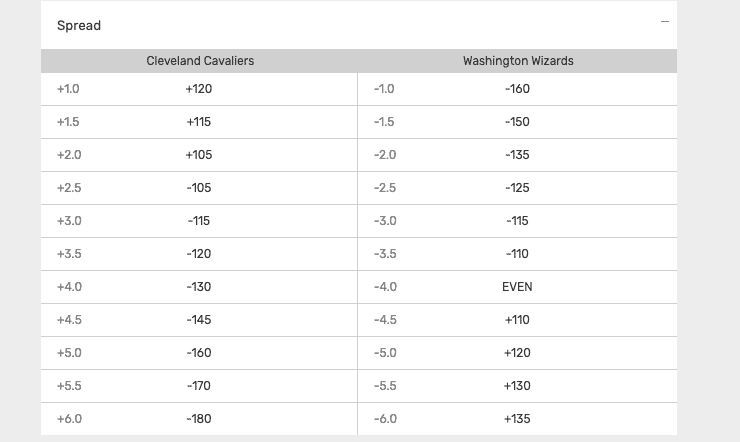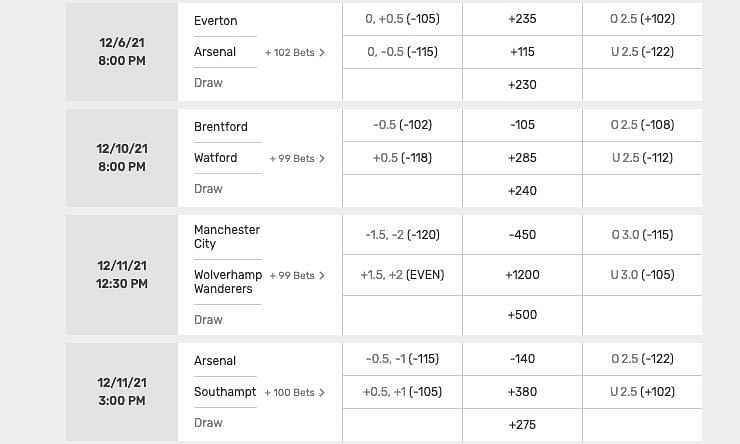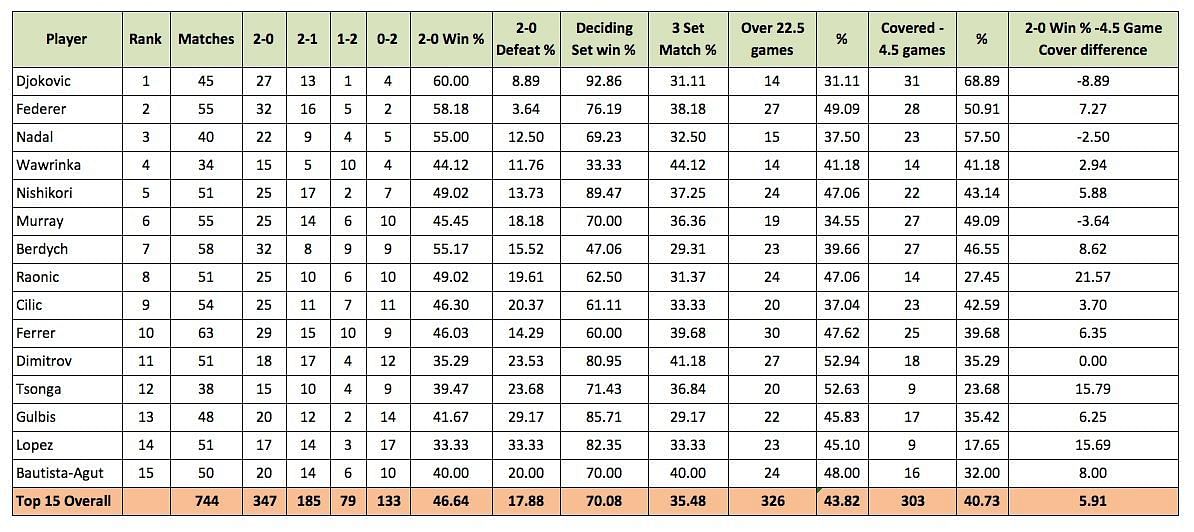Handicap betting is a type of wager that involves an element of surprise, as you are essentially betting on which team will win the game. Instead of simply picking one team to win and hoping they do, handicap betting allows you to predict whether a specific team will win by a certain number of points or more than a certain number of points. This makes it considerably more interesting than standard point spread betting, as you get to see how the game plays out in real time rather than simply assuming everything will go your way.
Contents
- How Does Handicap Betting Work?
- Handicap Betting Explained with Example
- How Does Handicap Betting Work in NFL, NBA, MLB, and NHL?
- How Handicap Betting Works in Soccer?
- How Handicap Betting Works in Golf?
- How Handicap Betting Works in Tennis?
- What Is Asian Handicap Betting and How Does It Work?
- How Do Handicap and Spreads Betting Differ?
- Tips on How to Win More at Handicap Betting
How Does Handicap Betting Work?
Handicap betting works on the simple principle of comparing one team's point total to another's. The “underdog “team is given a handicap, which adjusts its score accordingly. The favorite team does not get a handicap and is simply given a set number of points to win.
Betting handicaps gives smaller teams an advantage over bigger ones in terms of winning games and their final score. It can also make it easier for underdogs to cover spreads or beat point spreads and harder for favorites.
Handicap Betting Explained with Example
For example, say you're betting on college football. You'd pick one team to win and bet on them the same way you would a point spread bet. The handicap can be adjusted depending on how much of an underdog or favorite you think team A is versus team B.
For example, if your prediction is that team A will win by two touchdowns with no more than three turnovers, then your handicap for that game would be -2 points. If you predicted that A would win by 5 touchdowns with no turnovers and B would lose by 3 touchdowns with 4 turnovers, your handicap for that game would be +6 points. The handicap is simply an adjustment to their score, making it more likely they will win.

When betting on the handicap, you are betting on the margin of victory and not the actual goals scored.
Get your first bet risk-free (up to $500) when you join PointsBet here
How Does Handicap Betting Work in NFL, NBA, MLB, and NHL?
The actual process for handicap betting in sports is pretty straightforward. You choose the team you think will win the game and then pick a line that reflects your prediction. The difference between your predicted score and what the line is set at is your handicap, which determines how much you will win on your bet.
For example, if you predict that team A will win by two touchdowns with no more than three turnovers, you would bet on them at -2 points by placing a two-point spread wager. If they won by three touchdowns with no more than four turnovers (a seven-point spread), your stake would pay out six times the amount of money wagered on it.

In the NBA game above, players who wagered on the underdogs, the Suns, won, assuming the game finished between 100-95. This is because, in this case, the adjusted score ends at 100-93, which favors GSW.
How Handicap Betting Works in Soccer?
Handicap betting is a bit more complex in soccer because most results are not always predictable. For example, if there is a tied game at the end of regulation (or even overtime), there will be a shootout to determine who wins the game. This means that if you bet on a team to win based on their current record, you will be wrong more often than not. However, handicap betting can easily adjust for this fact by adjusting your predictions based on what you think will happen in the shootout.
For example, if you think one team is likely to win and will score more points than another, your handicap will be higher for them than for another team that is expected to lose or tie with them. To predict how many points a team is likely to score in a shootout, you need to predict how many goals they will score (or save). If they are expected to win, and you think they are going to score 6 goals or less, then your handicap should be +6 points, while if they are expected to lose or tie, and you think they're going to score seven goals or more, then your handicap should be -6 points.
Any movement in spreads on soccer has a significant effect on the odds. Handicap lines in soccer are harder to call since soccer goals are less than points scored in an NBA or NFL game. A slight change in handicap, for instance, a 0.5 change in handicap, could double the price. Here’s an example of a soccer handicap bet.

How Handicap Betting Works in Golf?
Golf handicap betting works similarly to handicap betting in hockey and basketball. The handicaps are based on the amount of money a golfer has won, known as their "money factor". If you bet on a golfer to win with a higher handicap than their money factor, you will be making money (winning bets) more often than if you bet on them with a lower handicap.
If you think one golfer will win and score more points, your golf betting will be higher for them than for another golfer who is expected to lose or tie. The handicaps are adjusted based on the amount each golfer has won in the past year. This means that it's possible to have the same handicap for two different players if they have similar amounts of wins. However, if one player has won more than $1 million while another has won less than $500k combined, they will have differing handicaps.
Table of Golf Handicap Estimator
| The average score on 18 goals | Estimated handicap |
| 70-75 | 1-2 |
| 76-80 | 3-5 |
| 81-85 | 6-9 |
| 86-91 | 10-13 |
| 92-97 | 14-19 |
| 98-101 | 20-24 |
| 102-106 | 25-28 |
| 107-112 | 29-33 |
Get up to a $1,000 bonus when you sign up to Superbook
How Handicap Betting Works in Tennis?
In tennis, the first and most common form of handicap betting is the "over". In this type of handicap, you will pick a team to win based on their current record, and you will also pick a set number of points that you think they will score in the match. If your team wins by more than the number of points you predicted, you win. If your team wins by less than the number of points you predicted, you lose.
For example, if a team is playing at home against a weaker opponent (or with a positive handicap), they are likely to win by a large margin (say 6–0 or 5–1). However, if they play at home against a stronger opponent (or with negative handicaps), they are likely to lose by even larger margins (say 4–6 or 6–0).
In the tennis bet results below, the winner covered the -4.5 handicap line with more than 11% the second position.

What Is Asian Handicap Betting and How Does It Work?
For those who don't know, Asian handicap betting is the same as American handicap betting. In the United States, it's commonly referred to as "dogs and hounds" or "heads and tails" betting. In Asia, it goes by other names like "Moneyline" or "point spread". The money line is a bet on one team to win by a certain amount of money, while the point spread is a bet on one team to win by a certain amount of points.
How Do Handicap and Spreads Betting Differ?
In handicap betting, how you adjust your bet depends on how far ahead or behind the point spread you think the team is. For example, if you believe Team A will win by 10 points and Team B will win by 7 points, your handicap would be +5 points. If you think Team A will win by 1 point and Team B will win by 9 points, your handicap would be -5 points. In this case, if either team wins the game by 10 or 7 points, you will lose your bet. You would still lose your bet if either team wins by 15 or 14 points. The difference between a handicap and a spread is that with a spread, you know exactly how many points either team has to win to cover the spread for each bet.
Tips on How to Win More at Handicap Betting
Use the best betting sites
Before you make handicap bets, use sites with the proper security certificates and valid licensing.
2. Look for the best odds
To increase your winning potential, compare the best odds from different bookmakers. It will take you a few seconds. Moreover, you will reap the rewards of a successful bet.
3. Consider team formation
Consider dominant teams and other forms of groups involved—home and away form matters, for the dominant team, and look at the particular tournament.
4. Wager on the most significant favorites
Heavy favorites are more likely to emerge winners than weaklings. In this case, the dominant team is best to bet on. Heavy favorites could also be teams strong at home.
5. Avoid Low scoring teams
The basic rule in handicap betting is to avoid low-scoring teams. Teams with a winning margin of 1-0 are unreliable. Though a team may be in the right form, winning most matches 1-0 could change. Use the right team tactics before wagering.